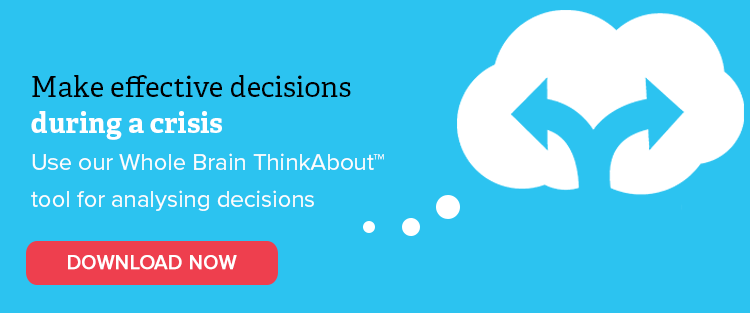If you ever needed cognitive diversity and thinking agility, now is the time! With the current global atmosphere of rampant change and volatility, you need to leverage all of the thinking resources available to you, especially when it comes to effective decision making in the face of crisis.
Our research has shown that decision-making requires breadth of thinking to ensure you cover all of your bases. In times of great stress or uncertainty, we tend to rely on one or two primary approaches (often our strongest preferences but not always).
Maintaining Long-Term Perspective
Analytical, quantitative leaders and managers often are great at doing analysis of the situation at hand but may focus solely on the numbers and be inclined to deeply slash expenses in a way that can have negative long-term impacts on the business.
One CEO who had experienced a recession some years earlier immediately started cutting everything back so severely that the business could barely function. It made her feel better, but a year later she readily admitted that in losing sight of her strategic purpose, she lost years of momentum. This loss of long-term perspective ultimately put her business at greater risk than it had been after the first economic crisis.
Avoiding “Crisis Mentality”
More safekeeping, practical leaders and managers immediately start planning an important part of any response to a crisis, yet too often want to curtail any risk at all by focusing mostly on very short-term decisions and reactions. It feels good to be “doing” something, but it may be the wrong thing.
Staying the course on a new product launch, developing creative solutions, or allowing some policy flexibility to meet employee needs just don’t happen, appearing to be too risky. This is a “crisis mentality” that responds in the only way it knows how—a retreat to safekeeping supervision of all identifiable processes in the business.
Setting a Calm, Timely Pace
Another leader, more inclined to relational thinking, could find himself overwhelmed by the emotional demands of the situation and experienced tremendous distraction as a result. His reaction inadvertently set the tone for the rest of the team, who began to worry and also become frustrated due to delayed financial, technological and operational decisions that needed to be made in a calm and timely fashion.
Recognising Change Fatigue
In contrast, an entrepreneur spent so much energy coming up with innovative ideas in response to the situation that she created even more change than the crisis was generating itself. Her team and organisation developed significant change fatigue above and beyond what the crisis had generated.
Staying the course on some initiatives can allow everyone to focus and not have to reinvent everything.
Stretching Your Thinking for Broader Perspective in Crisis Decision Making
So how do you avoid getting blindsided like the above leaders?
Put together a cognitively diverse crisis team to ensure you have access to broad perspective, especially as you make decisions.
Those of you who use the HBDI® Assessment and Whole Brain® Thinking Model already have many tools at hand to facilitate the formation of that team — and remember to watch for the impact of pressure on each individual’s profile!
For those who aren’t familiar with the Whole Brain® Thinking Model, you can find an introduction to both here.
Even with a cognitively diverse team, it is all too easy in the pressure of a crisis to slip into making decisions with a unidimensional approach. Use the Analysing Business Decisions ThinkAbout™ tool (from the Business Disruption chapter of the Whole Brain® Business Book) to prompt your thinking to visit each of the four quadrants, ensuring a much better outcome!
This article was originally published on our US site. It has been updated and republished here to ensure our readers don’t miss out on valuable information.


